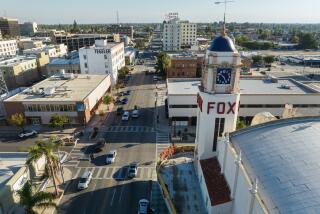West Covina, BKK Ponder Use of Landfill : After Years of Fighting, Old Opponents Now Pursue a Common Goal
Over the past 22 years, the city of West Covina and the BKK landfill have alternately courted each other’s favor and engaged in public mudslinging.
Their tumultuous relationship has been marked by intervention from angry residents, state, federal and local regulatory agencies and a controversy last summer that thrust the city and the dump into a nationwide media spotlight when 21 families were evacuated because of toxic gases migrating from the landfill.
But now, with the last of the families returned home, the city and BKK have taken on an air of cooperation and downright friendliness.
Gas migration has diminished and debate about the hazardous-waste dump has become relatively quiet. Now BKK’s owners and the city are looking at what both say has been the real problem all along: What to do with the dump, which voluntarily stopped receiving hazardous waste in November, and how to control leakage of the thousands of tons of toxic material dumped there.
BKK and city officials say they hope the terms of a stipulated agreement recently settled in Los Angeles Superior Court between BKK and regulatory agencies on methods of controlling and monitoring the hazardous gases migrating from the dump will solve the leakage problem.
The best use of the dump site, however, remains in question.
The city wants BKK to put the site to some use that has “nothing to do with landfills.” BKK wants the city to defer its $40,000- to $50,000-per-month tax payments in order to meet the conditions of the stipulated agreement.
A lot of bargaining power for the city rests between those two requests, say West Covina officials, who add that they are being careful in how they use it.
“We’re in a position that we haven’t been able to be in before to get some things done in terms of transition” of the site, City Manager Bob Fast said.
BKK President Ken Kazarian, whose firm still accepts non-hazardous waste at the 583-acre landfill, said he is “not too excited about putting ourselves out of business,” but he added that he is willing to discuss possible uses for the site with the city.
“I see BKK as being very cooperative with us,” Fast said, “and very cooperative with regulatoroy agencies. They are not standing at arm’s length firing mortars at each other.”
Such has not always been the case. The stipulated agreement settles a public-nuisance lawsuit filed last summer by the city against BKK and the agencies monitoring the dump.
In filing suit in Los Angeles Superior Court, West Covina also asked for a preliminary injunction to close BKK to hazardous-waste dumping. That injunction was denied, prompting the city to turn to the Environmental Protection Agency offices in San Francisco where they unsuccessfully lobbied for the EPA to halt the dumping.
Those efforts angered BKK and caused the most serious rift to date in relations between the firm and the city.
At the time, BKK’s Kazarian said his firm was the target of “public hysteria.” When the city, which sought reimbursement from BKK for expenses incurred during the evacuation, began submitting bills for such items as doughnuts and coffee, and air fare for the city officials who went to San Francisco to ask the EPA to close the dump, Kazarian balked.
“We’re doing everything except provide chauffeurs for these folks,” he said then.
In the months after the evacuation, Kazarian’s views about the city’s efforts to close BKK have softened. In a recent interview he said, “Naturally we weren’t very happy about it and it did strain the relationship quite a bit.”
‘Looking at the Reality’
But, he added, “we’ve reached a point now where both of us are sitting down and looking at the reality. What we’ve said is let’s stop arguing about the small things and look at the big picture. We have to look at what needs to be done at the site to maintain the environmental integrity.”
As early as 1974, city officials threatened to revoke BKK’s land use permit if the firm did not take quick action to stop odors escaping from the dump into adjacent neighborhoods. BKK rectified the situation and was allowed to keep operating.
As more homes were built around the landfill, complaints from residents about odors increased and West Covina threatened BKK again with revocation of its permit if the odors were not controlled.
The city’s control over BKK diminshed in 1981 when the Legislature passed Senate Bill 501, which prohibited cities and counties from closing toxic waste sites or unreasonably interfering with their operation.
After an inspection of the landfill in 1983 by the EPA and the state Department of Health Services found several violations of federal laws, West Covina sued the agencies and BKK, asking for a declaration of its power over the landfill. Los Angeles Superior Court Judge Thomas T. Johnson ruled that the city was preempted by the state in any control over hazardous waste qt the site.
That lack of power has made West Covina, at various times, more frustrated with the regulatory agencies than with BKK.
“For so long,” City Manager Fast said, “we hadn’t been able to get the EPA or the state Department of Health Services to do anything. It took years for them to even admit there was a problem out there.”
More to Read
Start your day right
Sign up for Essential California for news, features and recommendations from the L.A. Times and beyond in your inbox six days a week.
You may occasionally receive promotional content from the Los Angeles Times.






